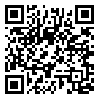Volume 21, Issue 1 (2024)
ioh 2024, 21(1): 0-0 |
Back to browse issues page
Research code: مقاله حاصل از پایانامه کارشناسی ارشد hse موسسه عالی انرژ
Download citation:
BibTeX | RIS | EndNote | Medlars | ProCite | Reference Manager | RefWorks
Send citation to:



BibTeX | RIS | EndNote | Medlars | ProCite | Reference Manager | RefWorks
Send citation to:
zokaie M, abbasi M, falahati M, abbasi J, zand salimi F, Zarie M. Safety risk assessment by creating a combined model of FMEA, FTA and AHP fuzzy methods Case study: steel industry exploitation phase. ioh 2024; 21 (1) : 19
URL: http://ioh.iums.ac.ir/article-1-3676-en.html
URL: http://ioh.iums.ac.ir/article-1-3676-en.html
Mojtaba Zokaie 
 , Milad Abbasi
, Milad Abbasi 
 , Mohsen Falahati *
, Mohsen Falahati * 
 , Jalal Abbasi
, Jalal Abbasi 
 , Fardin Zand salimi
, Fardin Zand salimi 
 , Mohamad Zarie
, Mohamad Zarie 


 , Milad Abbasi
, Milad Abbasi 
 , Mohsen Falahati *
, Mohsen Falahati * 
 , Jalal Abbasi
, Jalal Abbasi 
 , Fardin Zand salimi
, Fardin Zand salimi 
 , Mohamad Zarie
, Mohamad Zarie 

Social Determinants of Health Research Center, Saveh University of Medical Sciences, Saveh, Iran , falahati.mohsen64@gmail.com
Abstract: (172 Views)
Background and aims: One of the main factors in occupational health and safety management is the formulation and implementation of risk assessment. Applying a precise and appropriate approach in the implementation of risk assessment plays an important role in the organization's risk management.
Methods: In this research, five incidents were selected as the most important incidents in the exploitation phase of the steel industry. Estimating the probability of occurrence and discovering the root causes using fuzzy FTA was calculated and the severity of the consequence of the risk of accidents among 14 industry experts was collected and analyzed. Finally, the variables obtained in the previous steps were considered as inputs to the fuzzy inference system designed in MATLAB, and the final value of RPN was calculated using defined if-then rules.
Result: According to the obtained results, the probability of falling from a height, falling of objects, and electrocution were higher than other accidents, respectively. Finally, the risk of falling from a height and electrocution with RPN values of 0.665 and 0.563 are in the medium-high risk range, respectively. The risk of falling objects is also in the range of low-medium risks with RPN value of 0.37.
Conclusion: This model has the ability to be used in systems where there is no sufficient and reliable quantitative data to assign a rating to the input variables of probability of occurrence, probability of discovery and severity of the consequence, and the use of linguistic variables enables industry experts to make real judgments. have more than the system under study.
Methods: In this research, five incidents were selected as the most important incidents in the exploitation phase of the steel industry. Estimating the probability of occurrence and discovering the root causes using fuzzy FTA was calculated and the severity of the consequence of the risk of accidents among 14 industry experts was collected and analyzed. Finally, the variables obtained in the previous steps were considered as inputs to the fuzzy inference system designed in MATLAB, and the final value of RPN was calculated using defined if-then rules.
Result: According to the obtained results, the probability of falling from a height, falling of objects, and electrocution were higher than other accidents, respectively. Finally, the risk of falling from a height and electrocution with RPN values of 0.665 and 0.563 are in the medium-high risk range, respectively. The risk of falling objects is also in the range of low-medium risks with RPN value of 0.37.
Conclusion: This model has the ability to be used in systems where there is no sufficient and reliable quantitative data to assign a rating to the input variables of probability of occurrence, probability of discovery and severity of the consequence, and the use of linguistic variables enables industry experts to make real judgments. have more than the system under study.
Article number: 19
Type of Study: Research |
Subject:
Safety
Received: 2024/09/3 | Accepted: 2025/01/8 | Published: 2024/05/30
Received: 2024/09/3 | Accepted: 2025/01/8 | Published: 2024/05/30
Send email to the article author
| Rights and permissions | |
 |
This work is licensed under a Creative Commons Attribution-NonCommercial 4.0 International License. |
